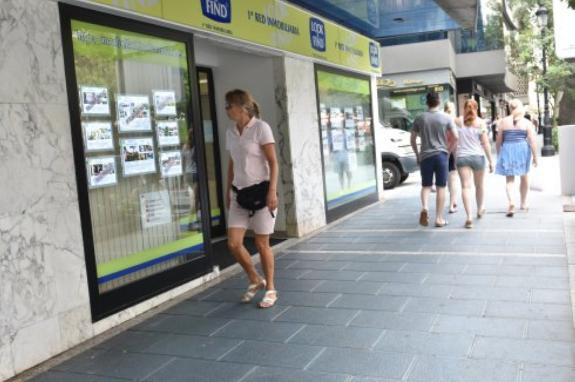Rents are now higher than the average salary of young people in Malaga
Although more are now living independently, the increase is very small: only two out of ten people aged under 30 have been able to move out of their parents' home
NURIA TRIGUERO
Lunes, 2 de septiembre 2019, 13:55
It is becoming increasingly difficult for young people to live independently, because rents are going up while their salaries are remaining almost the same, according to the latest report into emancipation from the Youth Council of Spain. It warns that fewer than 20 per cent are able to move out of their parents' home before the age of 30.
In Malaga there is another worrying factor: the average rent for an apartment is now higher than most young people's salaries.
THE FIGURES
-
is the average monthly salary of the working population aged between 16 and 29 in Malaga.
-
is the average monthly rent in the province.
-
of people aged under 30 who live independently in Spain are renting a property.
"The average net monthly salary of 16 to 29-year-olds in the fourth quarter of 2018 was 892 euros, and the average monthly rent for an apartment in Malaga is 903 euros. That means if someone in that age group wants to live on their own, they will have to pay an amount which is equal to 101.3 per cent of their monthly salary," explains economist Joffre López Oller, one of the authors of the report.
Just two years earlier, in 2016, rent would have been equivalent to 85.9 per cent of salary. After Palma de Mallorca and Barcelona, Malaga is the third city in Spain where rents have increased the most in recent years: more than 45 per cent between 2013 and 2019. Salaries have not kept up with that increase; in fact, they have remained practically the same.
Buying can be cheaper
The amount needed to buy a property has also risen considerably: in two years mortgage repayments have risen from 61.5 per cent to 70.9 per cent of an average salary. Even so, in Malaga it is still more expensive to rent than to pay a mortgage.
María Serrano, who is a teacher, can confirm that. After five years living on her own in the UK, she came back to Malaga and had to live with her parents. "I didn't want to, but when you see how much landlords want... old-fashioned apartments from the 1970s are 700 euros a month or more. I refused to pay that," she says. She now shares a two-bedroom apartment with her boyfriend and the rent is 800 euros a month. "That's actually cheap, because we know the owner, but we're still paying twice as much as friends who have a mortgage," she says.
Despite the difficulties, the rate of juvenile emancipation has actually improved in Malaga. In two years, the percentage of under-30s who have moved out of their parents' home has risen from 14.8 to 19.2 per cent.
"Malaga used to be below the national average, but is in line with it now," says Joffre López Oller, explaining that this is due to the rise in employment. The more young people who are in work, the more will manage to live independently. The conditions in which they do so are another matter.
Shared apartments
How do young people in Malaga become independent? Flatsharing, which used to be almost exclusively for students, is becoming increasingly common, even for those in their thirties. Sharing may not be the preferred option, but it is the only way for many people.
They are both aware that they can count themselves lucky. Most young people couldn't even aspire to a flatshare. María Maldonado is among the eight out of every ten young people trapped at home with their parents. "Nearly everyone I know, even people with university degrees, either live with their parents or are struggling to live on their own, and if they are on their own it's because the apartment is a relative's second home or their parents are helping them financially," she says.
This way of living is becoming more common, according to the report. Although most of those aged between 16 and 29 who live independently are renting, the number is dropping. The figures show that 60.6 per cent were renting a property in 2017, but last year that dropped to 59.2 per cent. It is not a big reduction, but it has broken the trend of recent years.
But what is "surprising", says the report, is that it is not because more people are buying a property, but are living somewhere owned by a relative. "We can't yet say that this will be a recurring phenomenon, but at present 12 out of every one hundred independent young people in Spain are living in a property owned by a relative," says López Oller.
With regard to property ownership, although at present mortgage repayments cost less than rent, it is still impossible for many young people to obtain a mortgage, partly because they have to provide guarantees and put down a deposit and partly because the Bank of Spain is advising financial institutions against lending to those who have to spend more than 30 per cent of their income on the repayments.
This is the main reason that the percentage of young people who own a property is not increasing. At present only 17.4 per cent are among this group.
